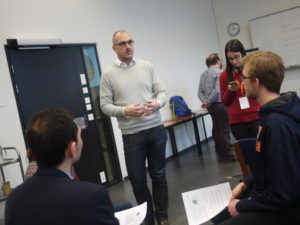Maxwell Executive Leadership Podcast #52: Leaders Secret Weapon: Developing Your Team

It’s crucial for leaders to take the time and effort to develop members of their teams. Developing your team is an often overlooked key of leadership and many leaders may not be aware of the skills needed to take their team to the next level. In Episode #52 of our Executive Leadership Podcast, we discuss the important steps that leaders should take to successfully invest in, equip and develop their team members.
To cultivate leadership development on your team, consider bringing a 5 Levels of Leadership Workshop to your organization this year.
Read Transcript Below:
Welcome to the John Maxwell Executive Leadership Podcast where our goal is to help you increase your reputation as a leader, increase your ability to influence others and increase your ability to fully engage your team to deliver remarkable results. I’m Perry Holley, a John Maxwell facilitator and coach. I’m Chris Goede, Vice President with the John Maxwell Company. Just a quick reminder, as we start, everything that we talk about on this podcast is really in reference to the 5 levels of leadership.
If you would like to learn more about the 5 levels of leadership or even perhaps bring the workshop to your organization, please go to John Maxwell company.com/podcast. Please leave any questions or comments for Perry and I below. We’d would love to see that and address that on a future podcast. As we kick off, you guys know, I love to give Perry a hard time about the titles, but we’re going to talk about this on another podcast. It’s key to our success. Today’s topic is titled a ‘Leader’s Secret Weapon, Developing Your Team’. What I love about this is that it’s really a level 4 mindset. Talk to us a little bit about this title and what we’re going to accomplish today.
I just find that personal and team development is a secret weapon because many leaders think they don’t have time as it’s a time investment that you’re making. I always laugh because Stephen Covey once asked somebody in the audience about sharpening a saw and they said, oh, it’s just takes so much time. He said, have you ever not had time or been too busy to stop your car to get gas? Everybody kind of snickers. It really falls in the important but not urgent quadrant that can easily be overlooked.
I think most leaders in those urgencies of life, the urgencies of business overshadow a lot of what we know is important that we shouldn’t be doing, but we would get caught in the urgent part. What we’re talking about here, for my team and for me personally, it’s like gas to my car that I go further without it. Without developing me, without developing my team, we’re going to run out of gas. We’re going to stop. I think the second half of what you said is really important. I think we talk a lot about that on this podcast and everything that John does about developing yourself as a leader.
Today we’re going to shift a little bit and talk about this Level 4 mindset of developing your team. I was on a call yesterday with an organization that we’re partnering with out of Texas. One of their key leaders had just gone through the Maxwell Leadership Assessment, which is a traditional 360 assessment that kind of maps into the levels and incredible scores. He’s an incredible leader. He’s had 10 years of leadership. He’s got the people and he’s got the respect he’s producing. At the end of it, some of the comments were really about, I really wish he would focus on developing me for that next opportunity. Developing where I need to be developed, not necessarily where he wants to go. We had a great conversation over him having that mindset.
You need to grow in this area too. Which is a different mindset than what we want to talk about today. And the importance of actually developing your team. When we talk about this we’re going to dive into, obviously, some of John’s content, but there’s a difference between training, equipping and developing someone. Let’s just start right here at the foundation. When we talk about training, really we’re talking about what jobs need to be done, what skill set do you need for that job? You’re really kind of teaching skills when we talk about equipping, it’s really about how do we do the job better. What tools do I need to provide to you as one of my team members in order to do the job a little bit better. Then we’re going to talk about developing, which is where our heart is, where our sweet spot is.
It’s really not job related, but rather about personal and organizational growth of your team member. What does that look like? What’s the future need of that individual in your organization? What you want to do is really improve the way that they feel, think and behave. That’s kind of the foundation of what I wanted to set today before we dive into this. One thing I learned over the years and will teach often now, especially through the 5 levels, is that you’re not leading just the corporate person. Here at John Maxwell company, you’re not just leading the John Maxwell person, you’re leading the whole person. My training is getting my skills up to equip me in what I need to do.
The job at development is about how to do life better and how to train the whole person. So not just the job aspects but the personal aspects. I know in the 5 levels workshop, John outlines in the content about 7 guidelines for people development. I thought we could just discuss them kind of quickly to reveal what those are. Let’s hone in on developing a piece of that. Number 1 is recruiting. Of course, you want to make sure as Jim Collins says in Good to Great, you have the right people on the bus crude. Well, that’s all right. Number 2 is positioning, which means after you have them on the bus, are they in the right seat? Then number 3, modeling, is a really a great one.
Are you showing the way because people are watching you? How often? All the time? That was a test that was completely off the cuff. I had wide eyes. I was like, what are you talking about? Recruiting, positioning and modeling kind of gets you on the road to where you need to be developing. And of those three, it’s interesting all the organizational work that we do without a shadow of doubt. It starts at recruiting and we talk to leaders about modeling. We say leaderships and observations go both ways. I see a lot of leaders that are around the positioning that just have the people in the wrong spots. They don’t necessarily understand the person as a whole, how they’re wired, their learned behaviors, their values, where their skill sets are. Their positioning always sticks out to me from some of the organizational work that we’ve done. Make sure as you’re thinking about your team you really challenge yourself to think about, is this the best position for that team member?
John talks about two more, numbers 4 and 5. We talked a little bit about this as I kind of kicked off equipping it, which is the tools and about doing the job better and then developing. It’s really about the personal and the organizational growth through that team member. You do a lot of training for organizations, you do a lot of the 5 levels and different onsite workshops. Talk a little bit about how you teach this when you’re onsite.
We always dive in a little bit about equipping, which means he really has to do more than just simply tell people what to do. You need to show them. John always says there are three things they want to know about you. Can you help me? Can you care about me? Can I trust you? And that can you help me is often overlooked. Can you show them how to do it? I love it. John laid out a 5-step approach, which really helped me a lot because I’ve found that I didn’t want to just throw something to someone because generally, they couldn’t handle it. Then I ended up having to do it myself and I think, why don’t I just do it myself? You just say, I’m just going to do it. John is kind of simple.
I’m kind of demonstrating for you and then you do it and I’m with you. I’ve stopped from demonstrating now I can be coaching a bit and then you do it, which is empowering. I’m empowering you to go and do it. Then finally you do it with someone else and now you’re reproducing. I like that model because I start to increase or multiply, as some of our friends say, the capabilities of my team by walking them through, handing it slowly to them by demonstrating it, walking with them, and then letting them go and do it. You know, I thought about when I said I have kind of a natural reaction to do the same thing. Sometimes as leaders we need to slow down in order to speed up futuristically and, at times, I will naturally not necessarily want to slow down to have someone with me while I’m doing it.
At the end of the day, it really pays off over time. If I would just slow down from kind of a development standpoint, because as leaders, it’s our responsibility to reproduce leaders in our organization under our influence, wherever that might be. It might be in your home, it might be in your community or it might be in your church. But it’s our responsibility to get to that point. So we’re talking about the level 4 way. When do we begin to reproduce ourselves? We really kind of need to slow down to speed up and you’ll never be able to really grow the organization or even the results you’re producing for the organization unless you began growing the individuals that are on your team.
Absolutely. That leads us to number 5 of the 7 guidelines for people development. And number 5 is developing, which really means teaching them to do life well. That’s really where we’re centered today. Let’s talk a little bit about developing, we’ll say younger people, right? I guess that all depends on your age, but young people couldn’t meet. Younger people coming up through your organization you will see weaknesses in their approach to people and, and some of their EEQ habits. What does that look like? So what I did was I took developing and kind of broke it down even a little bit further. Here’s three words in regards to what developing means to us as an organization that the John Maxwell Company communicates through coaching and facilitating.
Number 1 is assessing. Where they are when it comes to life skills. Try to make an assessment about their obvious weaknesses, blind spots or poor thinking. I would add, are there fatal flaws because there’s a difference between weakness and a fatal flaw. We can work with weaknesses, but when there’s a fatal flaw they may not be around very long. You owe that to them. Be aware of that when you’re assessing them. Second word is challenged. Let’s challenge them to improve. We’ll talk a little bit about this later. You think about some of the greatest leaders you’ve ever worked for at the end of the day, whether you liked it in the moment or not, they challenged you. What is it that you’re challenged to do?
Read, attend conferences, new projects, whatever it might be. The final word is support. Support them as they navigate life’s difficulties. Be available, encouraging and answer questions. Follow up, speak to some of the actions that they took. What I tried to do is I tried to put myself back in their shoes and remember when I was a young man at that time and coming up, what is it that I desired? What is it that I received, what didn’t I receive that I wish I would have? I tried to put myself in that situation.
I took over a senior leadership role and one of the guys on the team was a great thinker. He had great ideas. He just had a very bad approach to communicating the idea of the delivering method. His delivery was right in your face. I assessed that this was career limiting. A skill that he could not present in a positive way or even get people to buy in. He was right and he knew he was right. I also knew he was right, but it didn’t matter if you’re right, if you can’t communicate the way people hear it, sorry. I challenged him on your second point there to improve. Now, he had pushed back. He said, I don’t have a problem. They have a problem. I go, that’s the problem. I’m going to support you in this. I asked him, can I coach you and give you some insights?
It took about six months and he came back and said, I tried what you said and I really am noticing a difference in the way people respond to me. I go, yeah that’s kind of cool. The final two, just to wrap that up, we don’t want to leave people hanging with 5 out of 7, but number six was empowering because you enable people to succeed and really released them to go do the work that you’ve hired them to do. Then of course, number seven, measuring, don’t ever want to forget that one. We want to know how well they’re doing now that they’re empowered. How do we track that when we’re doing that? As we start heading toward the wrap up there, how do you see this? How do these seven levels all tie together?
As I kind of kicked off, you know, right after your title, the first thing that came to mind is this is really about reproducing leaders. This is really about increasing your level 4 influence. Not only will you see an effectiveness in your leadership, but you’ll see an effectiveness in the development and the production results the that the team will have and what you guys are producing. It makes me think about the 21 laws, the very first chapter of the law of lead. If you ever seen John teach it, you know, he stands on stage, hits his hand over and over again and he really talks about that. As leaders, you are the lid on your team and those that you have the privilege of having an influence on with in the work that we get to do around the world.
I take that illustration and for me, when I look at the 5 levels model, there is a lid right above level 3. All organizations, they get one, they get two sometimes for the most part, right? Everybody gets three. You’ve got to produce and have results in order to have a business and get a paycheck on Friday. Then there’s just a lid right there. And I think where organizations really need to focus is on this, developing leaders, developing your team and what it looks like? I really want to encourage you guys to think about where’s your lid personally? More importantly, and we’re talking about developing your team, where is the lid on your team in regards to the organization’s goals, vision and their mission. Where are you going and are you the leader that’s limiting the effectiveness and the efficiency of your organization by not developing your team?
Absolutely not. I’m just thinking about a limiting factor for many leaders, and John teaches us about quite a bit, is that I think your ability to develop another human being has a lot to do with how you see them. If you really value people and value them as an individual, you will have a desire to help them get better. John calls it, putting a 10 on their head. Can you envision a better future for them? Liz Wiseman called it, can you see their unique intelligence? Is there something that they do better than others on the team that you can help develop and bring to the highest level. But I know that if you don’t see people in a good light and if you don’t value them as humans, you’re going to have a really tough time developing them as professionals.
As we wrap up, I’ll give you three things that I wrote down. We talk about as leaders, you need to be able to see further than your team, right? You have to have a longer lens in view than your team. You’ve got to be able to communicate that. And I would say that that’s the same when it comes to belief. You have to have that 10 on people’s head. You have to have a higher belief than they do within themselves. Then you’ve got to be able to communicate that to them in order to get everything out of them that they were created to get out of. It reminded me, I was with John and Urban Meyer and we were doing an interview. We were at Mr. Hendricks place and it was really around sports and leadership and Urban Meyer said two things I’ll never forget.
He said, we are designed to pull greatness out of people. It’s a simple statement. We’re not called to just be average, nor is our team. And sometimes our team doesn’t know that they can be great. And so we’ve got to pull that out of them. Then he says this, you’ve got to push him really hard but love him really deep. I thought those were really two good points. I’ll close with this. We talk a lot about engagement and we say people will join your organization for one reason, but they’re not going to stay for that same reason. So as leaders, what are you doing to continue to develop your team, to add value to people, to keep them engaged.
I read this data from the state of employee engagement from Q One. Q One of 2019. So it’s pretty recent and there’s two things I want to share with you out of this. I’m tying this back to developing your people because this is going to drive engagement. It says that 81% of those that are engaged in organizations, which the number is still really low, trust their leaders. They trust them personally and they trust them with their professional development. Then it also said that 82% said that my engagement level is directly related to my immediate supervisor.
To those that you have influence with, what are you doing to develop them? They trust you and they say you’re responsible for their engagement, not the CEO, not the vice president, their immediate supervisor. We need to be providing development opportunities for these people because it’s a huge differentiator between being engaged with the organization and not being engaged. So really take that into consideration and have that mindset when you’re thinking about developing your team. As Chris told you, leave any comments or questions you may have about the podcast below. We’d love to hear from you there. This is the John Maxwell Executive Leadership Podcast.
Leave us your questions below! Also, if you have suggestions for future podcast topics or would like to talk with Chris Goede about helping your company submit your feedback!












Be the first to comment on "Maxwell Executive Leadership Podcast #52: Leaders Secret Weapon: Developing Your Team"